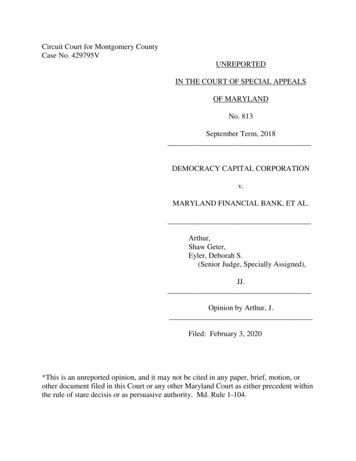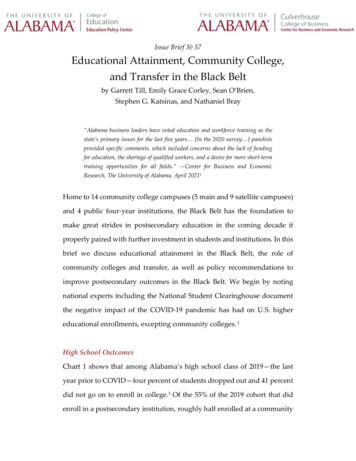
Transcription
Circuit Court for Montgomery CountyCase No. 429795VUNREPORTEDIN THE COURT OF SPECIAL APPEALSOF MARYLANDNo. 813September Term, 2018DEMOCRACY CAPITAL CORPORATIONv.MARYLAND FINANCIAL BANK, ET AL.Arthur,Shaw Geter,Eyler, Deborah S.(Senior Judge, Specially Assigned),JJ.Opinion by Arthur, J.Filed: February 3, 2020*This is an unreported opinion, and it may not be cited in any paper, brief, motion, orother document filed in this Court or any other Maryland Court as either precedent withinthe rule of stare decisis or as persuasive authority. Md. Rule 1-104.
— Unreported Opinion —This case arises from a dispute between companies owning various interests in adefaulted loan that is secured by real property. When it made the loan, the original lendersold a 50% participation interest in the loan to another lender. Several years later, theoriginal lender purported to assign the loan to its subsidiary.In a declaratory judgment action, the Circuit Court for Montgomery Countydetermined that certain provisions of the assignment agreement were unenforceablebecause those provisions contravened restrictions from the participation agreement.Seeing no reversible error, we affirm the judgment.FACTUAL AND PROCEDURAL BACKGROUNDA.Participants in the Sojourner-Douglass College LoanOn September 20, 2007, American Bank extended a loan in the amount of 8.4million to SDC Equities, LLC. The loan was guaranteed by Sojourner-Douglass College,Inc., which at that time operated a private college in Baltimore City. In the event of adefault, the loan documents authorized American Bank, or its successors and assigns, topursue a foreclosure on two properties: the College’s main academic building at 200North Central Avenue and its administrative office building at 500 North Caroline Street.On the same day that it issued the loan, American Bank entered into the“Participation Agreement”1 with Maryland Financial Bank. For 4.2 million, Maryland1Generally, a loan participation is a contractual arrangement in which aparticipating lender “provides funds” to a lead lender, and the lead lender “in turn usesthe funds from the participant to make loans to the borrower.” In re AutoStyle Plastics,Inc., 269 F.3d 726, 736 (6th Cir. 2001) (citations and quotation marks omitted). “In atypical loan participation among banks . . . , the lead bank will appear as the only party onthe note and mortgage.” McVay v. Western Plains Serv. Corp., 823 F.2d 1395, 1398
— Unreported Opinion —Financial Bank purchased “an undivided 50% interest in the Loan and the LoanDocuments” and the rights and obligations thereunder. American Bank retained a 50%interest and agreed to administer and service the loan for the mutual benefit of bothparties. The Participation Agreement included provisions restricting the conditions underwhich either party might transfer their respective interests to third parties.On the same day that it entered into the Participation Agreement, MarylandFinancial Bank also entered into the “Sub-Participation Agreement,” through which itsold 82.14% of its interest, for 3.45 million, to the entity now known as 1880 Bank.2Maryland Financial Bank represented that it had full authority to sell the sub-participationinterest, even though it did not obtain prior approval from American Bank.When the loan balance became due, neither the borrower nor the guarantor madefull repayment. American Bank twice agreed to extend the maturity date. During 2015,however, American Bank declared the loan to be in default after the College lost itsaccreditation and ceased operations. Thereafter, the two properties were left vacant.B.The Assignment Agreement with Democracy Capital CorporationThe original lender, American Bank, planned to merge into Congressional Bankeffective January 1, 2016. As a condition for the merger, Congressional Bank requiredthat American Bank assign certain assets to a subsidiary corporation and then divest its(10th Cir. 1987). The lead bank usually “services the loan,” and in that role has the rightand duty “to make decisions concerning acceleration, foreclosure, redemption anddeficiencies.” Id.2At the time, 1880 Bank was known as the National Bank of Cambridge.2
— Unreported Opinion —ownership of that corporation by distributing all of the capital stock in the subsidiary tothe shareholders of American Bank. Through this process, Congressional Bank wouldavoid acquiring non-performing loans that might impair its overall lending capacity.Among other assets, Congressional Bank required American Bank to assign theSojourner-Douglass College loan to the new corporation.3Democracy Capital Corporation was incorporated as a subsidiary of AmericanBank on December 31, 2015. Three minutes before midnight on that date, DemocracyCapital and American Bank entered into the “Assignment and Servicing Agreement.”American Bank agreed to transfer “all of [its] right, title and interest” in the loan and loandocuments to Democracy Capital. American Bank (soon to merge into CongressionalBank) agreed that it would continue servicing the loan, subject to provisions grantingDemocracy Capital extensive rights to control loan servicing decisions. CongressionalBank was not a signatory to the Assignment Agreement, but it participated in thenegotiations to ensure that the terms would be acceptable to it as the successor toAmerican Bank.The Assignment Agreement included expressions of the parties’ intent to honorthe rights of Maryland Financial Bank under the Participation Agreement. Nevertheless,the parties did not seek or obtain prior written consent from Maryland Financial Bank.Documents associated with the merger described this transaction as a “Spinoff”and used the name “Spinco” as a placeholder for the name of the new entity that wouldbe created to receive assets from American Bank.33
— Unreported Opinion —C.The Initial Claims and Settlement AgreementSeveral months after the loan had been declared in default, Maryland FinancialBank requested that Congressional Bank, as the successor loan servicer, instituteproceedings to foreclose on the vacant properties. Congressional Bank declined to do so.Maryland Financial Bank believed that Democracy Capital influenced CongressionalBank’s decision not to proceed with a foreclosure at that time.On January 30, 2017, Maryland Financial Bank filed suit in the Circuit Court forMontgomery County, alleging that Congressional Bank breached the ParticipationAgreement by entering into the Assignment Agreement without the consent of MarylandFinancial Bank. Congressional Bank counterclaimed, alleging that Maryland FinancialBank had breached the Participation Agreement, many years earlier, when it sold subparticipation rights to the predecessor of 1880 Bank. Congressional Bank joined 1880Bank, the sub-participant, as a party to that counterclaim. For its part, 1880 Bankconditionally claimed that Maryland Financial Bank would be in breach of an expresswarranty if, in fact, it lacked authority to sell sub-participation rights.Those three parties (Maryland Financial Bank, Congressional Bank, and 1880Bank) soon agreed to settle their respective claims against each other. With the expressconsent of Maryland Financial Bank, Congressional Bank agreed to assign the loan, theloan documents, the Participation Agreement, and the Assignment Agreement to 1880Bank. The settlement agreement contemplated that Congressional Bank would deliverthe original loan documents to 1880 Bank, so that 1880 Bank could take over as the loanservicer and pursue a foreclosure without delay.4
— Unreported Opinion —Democracy Capital, however, objected to Congressional Bank’s proposedassignment to 1880 Bank. Democracy Capital invoked terms of the AssignmentAgreement in which the lender had promised that it would not assign the loan and wouldnot resign or withdraw as loan servicer without Democracy Capital’s consent.Democracy Capital informed Congressional Bank that it had possession of the originalloan documents and that it intended to retain possession of those documents to preventthe proposed assignment.Despite that objection, Congressional Bank executed an agreement to assign theloan and loan documents to 1880 Bank. The three settling parties filed a joint stipulationdismissing with prejudice their respective claims against each other.D.The Remaining Claims Involving Democracy CapitalIn the same action, Congressional Bank had also raised a claim against DemocracyCapital, seeking a declaratory judgment that any terms of the Assignment Agreementcontrary to the terms of the Participation Agreement were unenforceable. Separately,Maryland Financial Bank had raised claims for damages against Democracy Capital,alleging that Democracy Capital intentionally deprived Maryland Financial Bank of itsrights under the Participation Agreement. Although Democracy Capital was a defendantto these claims, it did not agree to the settlement reached by the other parties.1880 Bank filed a notice of substitution, seeking to replace Congressional Bank,by virtue of the assignment, as the plaintiff in the declaratory judgment claim againstDemocracy Capital. Maryland Financial Bank moved to dismiss its own claims fordamages against Democracy Capital, without prejudice. The circuit court overruled5
— Unreported Opinion —Democracy Capital’s objections to the substitution and to the dismissal without prejudice.In the wake of the settlement, Democracy Capital brought claims against thesettling parties. Democracy Capital sought a declaratory judgment invalidatingCongressional Bank’s assignment to 1880 Bank, as well as an injunction prohibiting1880 Bank from taking any action as the loan servicer. Democracy Capital also raisedclaims for damages against the other three parties. Democracy Capital later moved for avoluntary dismissal, without prejudice, of all of its claims. The court permittedDemocracy Capital to dismiss its counts seeking damages, but not the count in which itsought declaratory and injunctive relief. The court directed that Democracy Capital’sremaining claim would proceed against Maryland Financial Bank and 1880 Bank, but notCongressional Bank.4In addition, 1880 Bank raised its own claims for declaratory relief againstDemocracy Capital. 1880 Bank asked the court to declare that the assignment that itreceived in the settlement with Congressional Bank was valid and enforceable; that, byvirtue of that assignment, 1880 Bank now possessed exclusive authority to service theloan; and that the terms of the Participation Agreement superseded and nullified anycontrary terms from the Assignment Agreement.Collectively, three counts remained after the various dismissals: 1880 Bank’sclaim for declaratory relief, through its substitution for Congressional Bank; DemocracyCapital’s claims for declaratory relief and ancillary injunctive relief; and 1880 Bank’s4Democracy Capital had named Congressional Bank as a defendant, butDemocracy Capital never served Congressional Bank with that pleading.6
— Unreported Opinion —independent claim for declaratory relief. Maryland Financial Bank remained a defendantto the opposing claims for a declaratory judgment.5E.Cross-Motions for Summary JudgmentOn March 28, 2018, Democracy Capital and 1880 Bank filed cross-motions forsummary judgment as to the remaining claims. Democracy Capital contended that theassignment from Congressional Bank to 1880 Bank as part of the settlement was invalid,and thus that 1880 Bank had no right to act as the loan servicer. 1880 Bank contendedthat its assignment from Congressional Bank was valid and that, as a result, 1880 Banknow had “unilateral” authority to service the loan. 1880 Bank also argued that theprovisions in the Assignment Agreement purporting to grant Democracy Capital the rightto control loan servicing decisions were unenforceable. Maryland Financial Banksubmitted a consolidated memorandum in opposition to Democracy Capital’s motion andin support of 1880 Bank’s motion.The arguments largely focused on the language of two agreements. 1880 Bankand Maryland Financial Bank contended that the Assignment Agreement violated theParticipation Agreement, while Democracy Capital denied any conflict between thosetwo agreements.5In its pleadings, 1880 Bank explained that it had included Maryland FinancialBank as a “nominal” defendant “only because it is a necessary party” for declaratoryrelief. See generally Md. Code (1974, 2013 Repl. Vol.), § 3-405(a)(1) of the Courts andJudicial Proceedings Article (stating that “[i]f declaratory relief is sought, a person whohas or claims any interest which would be affected by the declaration, shall be made aparty”).7
— Unreported Opinion —Pertinent Terms of the Participation AgreementThe Participation Agreement defined American Bank as the “Lender” andMaryland Financial Bank as the “Participant.” The Participant received “an undivided50% interest in the Loan and in the Loan Documents and in all rights, benefits,obligations, payments, fees, proceeds (including insurance proceeds), awards, expensesand costs arising from or out of the Loan and Loan Documents.” Their respectiveinterests would be “ratably concurrent” and “none of the interests in the Loan and theLoan Documents [would] have priority over the other interests.”As defined by the Participation Agreement, the “Loan Documents” included adeed of trust note, a guaranty agreement, and an indemnity deed of trust and securityagreement associated with the Sojourner-Douglass College loan. The Lender promisedthat it would possess those documents “free and clear of all liens and encumbrances” andhold the “Loan Documents and all rights with respect to the Loan and any collateralsecuring the Loan . . . in its own name for the benefit of the Lender and the Participant[.]”Under the Participation Agreement, the Lender had the responsibility to make alldecisions regarding the day-to-day administration of the loan, but the Lender could notmake certain “Material Changes” without the Participant’s consent. Among other things,the Lender generally could not “make or consent to any sale, pledge, assignment, release,substitution or exchange of any of the Loan Documents, or any collateral or security heldfor the Loan” without prior written consent from the Participant. The Lender wasempowered to take one of those actions without consent only if the Lender determined ingood faith that the action was necessary to protect the interests of both parties.8
— Unreported Opinion —The Participation Agreement stated that the Lender had “the exclusive right toservice the Loan[.]” To that end, the Lender was required to collect loan payments andany other sums received in connection with the loan and to promptly disburse an equalshare to the Participant. The Lender promised to “service the Loan in accordance withacceptable mortgage practices of, and ordinary care exercised by, prudent lendinginstitutions.”In the event of a default on the loan, the Lender was obligated to “consult withParticipant . . . and make a good faith effort to mutually agree upon a course of action”before exercising any of the remedies for a default as set forth in the loan documents. Ifthey could not mutually agree, then the Lender’s chosen action would be binding, as longas the choice was made in good faith. In the event of a default on the loan and“acquisition of title by purchase at foreclosure or deed in lieu of foreclosure,” the Lenderwould “hold title to the Property on behalf of Participant” and would “have the exclusiveright” to sell the property and disburse the proceeds. During a period of title acquisition,the Lender would be required to consult with the Participant and to make good faithefforts to agree upon the appropriate action, but the Lender otherwise would be free totake actions it deemed to be in the best interests of itself and its Participant. These titleacquisition activities were specifically “included within the word ‘servicing’” as definedin the Participation Agreement.The Lender “reserve[d] the right to sell additional participations in the Loan andLoan Documents in such amounts and to such parties as it determine[d] in its solediscretion.” If the “Lender elect[ed] to sell additional participations in the Loan,” the9
— Unreported Opinion —Lender could “do so by a separate agreement on terms other than those contained” in theParticipation Agreement, “provided that involvement of other participants w[ould] notadversely affect the rights or obligations of Participant” under the ParticipationAgreement.If the Lender assigned “all or part of its Percentage Interest in the Loan orProperty,” then its assignee would “become another participant with respect to thePercentage Interest or portion thereof in the Loan or Property thus assigned[.]” In thatevent, the Lender would remain obligated to “continue to service the Loan or propertyand exercise all the powers” set forth in the Participation Agreement with regard to loanservicing.Except in certain circumstances in which the Lender was no longer able tocontinue meeting its contractual obligations, the Lender could not “assign or otherwiserelinquish Lender’s obligations and duties as servicer of the Loan or Property without theprior written consent of Participant.”To recapitulate, the Participation Agreement prohibited the Lender from makingor consenting to an assignment of the loan documents without prior written consent fromthe Participant and prohibited the Lender from assigning or otherwise relinquishing itsservicing obligations and duties without prior written consent from the Participant. TheParticipation Agreement permitted the Lender to sell additional participations in the loan,provided that the involvement of other participants would not adversely affect the rightsor obligations of the Participant. In that context, the Lender proceeded to enter into theAssignment and Servicing Agreement without prior written consent from the Participant.10
— Unreported Opinion —Pertinent Terms of the Assignment and Servicing AgreementThe Assignment and Servicing Agreement designated American Bank (soon tomerge into Congressional Bank) as the “Assignor” and Democracy Capital as the“Assignee.” The Assignor agreed to transfer “all of Assignor’s right, title and interest inthe Loan, the Loan Documents, all existing property and interests in collateral securingthe Loan, and all existing and future claims against Borrower or any other persons liablefor repayment of the Loan or the performance of Borrower’s obligations under the LoanDocuments” to the Assignee.The parties recited their “express intention” that the Assignment Agreement would“comply in all respects with all of the terms and conditions” of the ParticipationAgreement, in which Maryland Financial Bank had purchased a 50% participationinterest. The Assignor represented that the Assignment Agreement “complie[d] with” theParticipation Agreement and agreed “to remain bound by all of the terms and provisions”of the Participation Agreement.The Assignment Agreement provided: “Until notified by Assignee to the contrary,during the term of this Agreement, the Assignor shall administer and service the Loan . . .in accordance with the usual and customary practices employed by other commercialbanks servicing loans of similar size and type to the Loan and otherwise consistent withregulatory guidelines and requirements.” The Assignee “designate[d] and appoint[ed]Assignor to act as the ‘agent’ of the Assignee” in accordance with their agreement.“However, and notwithstanding” that grant of authority, the Assignor was notpermitted to take certain actions without consent from the Assignee. Among other11
— Unreported Opinion —things, the Assignor could not “[a]ct with respect to any Loan default without the writtenconsent of the Assignee[.]” Nor could the Assignor “[s]ell, transfer, or assign the Loan,excepting any sale, transfer or assignment in full repayment of the Loan” without theAssignee’s consent. On the other hand, if the Assignee requested that the Assignor takeone of those actions, the Assignor would be required to do so “promptly upon receipt ofsuch request, so long as such request [was] not in contravention of the prevailing LoanDocuments or [the Participation Agreement].”The Assignment Agreement specified: “In the event of default by the Borrower orany obligor, Assignee, in its sole discretion, shall have the right to take any and all stepsdeemed reasonable in the handling of said default from the inception thereof until saiddefault is cured or the security is foreclosed.” It was “understood that the Assignee shalldetermine, in its discretion, whether foreclosure shall be under a power of sale throughcourt action and as to whether or not a deficiency judgment shall be obtained.” TheAssignee also had “the power to accept a voluntary conveyance in lieu of foreclosure.”The Assignor was not permitted to “resign or withdraw as servicer of the Loan”“[w]ithout the prior written consent of Assignee” and “except as may be expresslypermitted by [the Participation Agreement] and approved in writing by [MarylandFinancial Bank].” Nevertheless, the Assignee, “in its sole discretion, for any reason orfor no reason at all,” had “the right at any time . . . to terminate the Assignor as servicerof the Loan[.]”Upon such a termination, the Assignee could then “demand and receive paymentdirectly” for any “sums due under the Loan Documents[.]” In those circumstances, “at12
— Unreported Opinion —the option and immediately upon demand of the Assignee,” the Assignor would berequired to “assign and deliver to the Assignee . . . all original Loan Documents held bythe Assignor,” subject to the participation rights of Maryland Financial Bank. “[I]n suchevent and immediately upon demand of the Assignee,” the Assignor would be required to“deliver to Assignee the Note, duly indorsed to the order of Assignee, a generalassignment of the Loan Documents . . . , and any other documents reasonably necessaryto evidence the transfer ownership [sic] of the Loan and the Loan Documents toAssignee[.]”F.Judgment of the Circuit CourtThe circuit court took the motions under advisement after a hearing. On May 18,2018, the court issued a memorandum opinion explaining its decision to grant summaryjudgment against Democracy Capital and in favor of 1880 Bank. Overall, the courtconcluded that the Assignment Agreement clashed with the Participation Agreement.The court applied the principle that “an assignment in violation of an antiassignment clause is invalid and unenforceable.” Della Ratta v. Larkin, 382 Md. 553,570 (2004) (citing Public Serv. Comm’n v. Panda-Brandywine, L.P., 375 Md. 185, 203(2003)). The court explained that, under the Participation Agreement, the lender couldnot “assign away its obligations as servicer” or “assign the loan documents to another”without prior consent from the Participant, Maryland Financial Bank. The court reasonedthat, by entering into the Assignment Agreement, the lender “attempted to assign” toDemocracy Capital “several of the key obligations” that it had undertaken in theParticipation Agreement. The court said that the Assignment Agreement “touched [the13
— Unreported Opinion —lender’s] very ability to service the loan and protect its and [Maryland Financial Bank’s]interests in it.” The Court explained: “Because these assignments violated explicit antiassignment clauses in the Participation Agreement, the attempted assignments arethemselves invalid and unenforceable.”The court rejected Democracy Capital’s argument that these transfers could be“saved” from invalidation because some language in the Assignment Agreementacknowledged the continuing force of the Participation Agreement. The court wrote:“Merely saying that this assignment ‘complied’ with the Participation Agreement doesnot make it so[.]” Similarly, the court stated that an “empty . . . promise to ‘remainbound’ by the Participation Agreement” would not “undo the fact that [the lender]assigned its interests in the loan documents without [the Participant’s] consent.”The court rejected the notion that these transfers were permissible under the clausestating that the lender could “sell additional participations in the Loan . . . by a separateparticipation agreement on terms other than those contained herein, provided thatinvolvement of other participants w[ould] not adversely affect the rights and obligationsof Participant hereunder.” The court reasoned that the Participation Agreement gave theParticipant “the right to deal with a lender that simultaneously held the loan documents,serviced the loan, [and] pursued its remedies in the event of default, and the right not tobe undermined by other participants.” The court said that the Assignment Agreementoperated to “‘fractionalize’ or disperse the obligations of one lender into the hands of twoentities[.]” In the court’s view, it was “obvious” that the Maryland Financial Bank’s“rights were ‘adversely affected’ by the dispersal of [the lender’s] obligations between14
— Unreported Opinion —itself and Democracy.” Most notably, because of the involvement of Democracy Capital,Maryland Financial Bank was no longer dealing with a lender “empowered” to pursue aforeclosure or other remedies for the default on the loan.The court concluded that the provisions of the Assignment Agreement purportingto authorize Democracy Capital to forbid Congressional Bank from assigning the loan orresigning as servicer “are themselves invalid.” “Thus,” the court said, “althoughDemocracy objected to the assignment to 1880, Democracy had no right to do so, and itsobjection is no barrier.” On that basis, the court rejected Democracy Capital’s request toinvalidate the assignment that 1880 Bank received from Congressional Bank as part ofthe settlement.In a declaratory judgment accompanying the opinion, the court declared that theAssignment and Servicing Agreement is “unenforceable” to the extent that it:“purportedly permits Democracy to terminate the servicer” of the loan; “purportedlyaffords Democracy the right to withhold consent to the Lender’s assignment of itsservicing obligations” of the loan; and “purportedly permits Democracy to possess andhold” the original loan documents. The court further declared that 1880 Bank “is thelawful Lender under the Participation Agreement, with full authority to act as loanservicer pursuant to the Lender’s rights and obligations as set forth in the ParticipationAgreement, including the right to exercise any and all Lender remedies available in theevent of a loan default under the loan documents and applicable law[.]”Democracy Capital made a timely motion to alter or amend the judgment andnoted a timely appeal. After a hearing, the court granted the motion in limited part, by15
— Unreported Opinion —revising one sentence of its opinion.6 The court denied the motion in all other respects.Democracy Capital then filed an amended notice of appeal.Despite the court’s decisions, Democracy Capital refused demands to relinquishpossession of the original loan documents. 1880 Bank and Maryland Financial Bankjointly petitioned for an injunction requiring Democracy Capital to deliver the originalloan documents to 1880 Bank. Democracy Capital opposed the petition, arguing that thedeclaratory judgment did not require it to turn over those documents. The courtdisagreed and, after another hearing, ordered Democracy Capital to deliver the originalloan documents to 1880 Bank. Democracy Capital then filed a second amended notice ofappeal.QUESTIONS PRESENTEDIn this appeal, Democracy Capital asks this Court to reverse the judgment and todirect the circuit court to grant Democracy Capital’s opposing claim for a declaratoryjudgment. Maryland Financial Bank asks that the judgment be affirmed in its entirety.1880 Bank has “adopt[ed] the contents” of Maryland Financial Bank’s brief and madeadditional arguments in its own brief. Congressional Bank, “to the extent that isconsidered a party to this appeal[,]” has joined 1880 Bank’s brief.In its brief, Democracy Capital presents the following four questions:1. Did the circuit court commit reversible error when it failed to find thatDemocracy’s veto right under the Assignment Agreement was valid andIn its original opinion, the court had written that American Bank “took no actionto collect” when the borrower and guarantor failed to make full payment on the originalmaturity date of the loan. The court struck that sentence from the opinion, because theparties agreed that this factual allegation was neither undisputed nor material.616
— Unreported Opinion —enforceable, given that Democracy’s veto right was the functionalequivalent of Maryland Financial Bank’s veto right under the ParticipationAgreement and did not adversely affect Maryland Financial Bank’s rightsunder the Participation Agreement?2. Did the circuit court commit reversible error when it found thatDemocracy’s rights under the Assignment Agreement violated MarylandFinancial Bank’s rights under the Participation Agreement based on itserroneous finding that Democracy had been assigned servicing obligationunder the Assignment Agreement, its failure to consider provisions in theAssignment Agreement, and its creation of hypothetical conflicts?3. Did the circuit court commit reversible error when it failed to grantsummary judgment in Democracy’s favor and failed to find that theassignment to 1880 was invalid, void, and unenforceable?4. Did the circuit court commit reversible error when it found that 1880had standing to challenge the validity of parts of the AssignmentAgreement even though it was neither a party nor third party beneficiary ofit?Upon consideration of these issues, we conclude that Democracy Capital hasfailed to demonstrate any basis for reversal. The judgment will be affirmed.DISCUSSIONAfter the dismissal of all claims for damages, the parties ultimately presentedcompeting claims
2 At the time, 1880 Bank was known as the National Bank of Cambridge. . 1880 Bank filed a notice of substitution, seeking to replace Congressional Bank, by virtue of the assignment, as the plaintiff in the declaratory judgment claim against . See generally Md. Code (1974, 2013 Repl. Vol.), § 3-405(a)(1) of the Courts and











